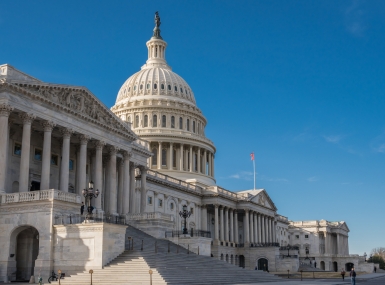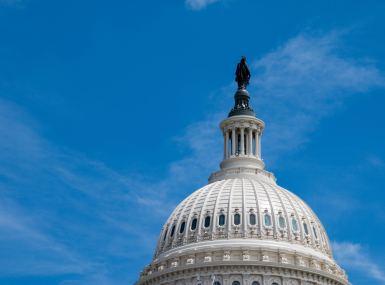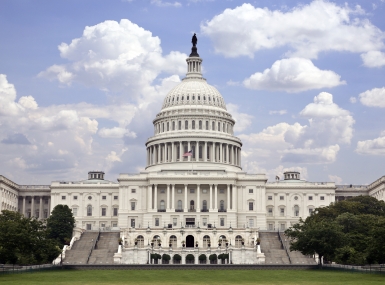State and Local Tax (SALT) Deduction Legislation in the 118th Congress

Author

Paige Mellerio
Upcoming Events
Related News
The original 1913 federal tax code allowed taxpayers to deduct state and local taxes paid from their federally taxable income. Since state and local taxes are mandatory payments, the state and local tax (SALT) deduction prevented double taxation. As state and local property, income and sales taxes typically finance the critical infrastructure and services we provide our residents, the SALT deduction also allowed state and local governments to maintain authority over local tax structures.
The 2017 Tax Cuts and Jobs Act (P.L. 115-97) capped the SALT deduction at $10,000 per year, consisting of property taxes plus state income or sales taxes, but not both through tax year 2025. Prior to the establishment of the cap, SALT was one of the highest claims made by individuals on their annual tax filings and capping the deduction at $10,000 has limited state and local control of tax systems shifting the intergovernmental balance of taxation. Counties opposed this portion of the tax reform law and have been advocating to fully restore the SALT deduction ever since.
In November 2020, the Internal Revenue Service (IRS) issued a notice (Notice 2020-75) clarifying that certain “pass-through entities” like LLCs, partnerships and subchapter S Corporations, were not subject to the SALT deduction cap. This means the $10,000 cap only applies to state and local taxes paid by individual taxpayers and not those paid by “pass-through entities.” To put this most simply, instead of allowing working families in every one of our communities to deduct the amount they pay in state and local taxes, the SALT deduction cap requires taxpayers – who make up the backbone of our economy – to pay taxes a second time on the same income. The restrained ability to use this deduction has had a drastic impact on homeownership, and the value of current homes.
Repealing the SALT cap would reverse the current double standard where businesses and landlords may deduct their state and local taxes, but individuals who achieve the American dream of homeownership are capped and held to a different standard.
SALT in the 118th Congress
The introduction of legislation to restore the SALT deduction coincides with the re-launch of the bipartisan SALT Caucus in the 118th Congress. Led by Reps. Andrew Garbarino (R-N.Y.), Josh Gottheimer (D-N.J.), Young Kim (R-Calif.) and Anna Eshoo (D-Calif.), the SALT Caucus is comprised of U.S. House members of both parties whose key priority is restoring the SALT deduction. The caucus initially formed in the 117th Congress and was successful in advancing legislation through the U.S. House to raise the $10,000 SALT cap. However, these proposals were never considered by the U.S. Senate.
In addition to the $10,000 cap on the SALT deduction, several provisions of TCJA are set to expire in 2025 such as the reductions in income tax rates. As such, in February 2023 senior Ways & Means Republican Rep. Vern Buchanan (R-Fla.) led 72 lawmakers in reintroducing the TCJA Permanency Act to make the TCJA provisions that expire in 2025, including the SALT cap, permanent. NACo opposes this bill and any other efforts to extend the $10,000 cap on the SALT deduction beyond 2025 or make the cap permanent.
The below chart details legislation introduced in the 118th Congress related to restoring the SALT deduction.
Bill Title/Number | Overview | County Position | Sponsors | Status |
|---|---|---|---|---|
*Current Law: Tax Cuts and Jobs Act (P.L. 115-97) | Among other items, the Tax Cut and Jobs Act (TCJA) capped the state and local tax (SALT) deduction at $10,000 per year through tax year 2025. | NACo opposed this portion of the Tax Cuts and Jobs Act. | N/A | Signed into law December 2017; effective January 1, 2018 |
If enacted, this bill would retroactively restore the deductibility of SALT by repealing the $10,000 cap established by the TCJA from 2018 to 2025 and provide taxpayers with refunds for lost SALT deductions. | NACo supports the full reinstatement of the SALT deduction in the federal tax code. | Reps. Mike Garcia (R-Calif.) and Jimmy Panetta (D-Calif.) | Introduced in U.S. House on January 9, 2023 | |
If enacted, this bill would increase the current cap on the SALT deduction from $10,000 (and $5,000 in the case of a married individual filing a separate return) to $100,000 (and $200,000 in the case of a joint return). | While counties appreciate efforts to expand the SALT deduction, NACo supports the full reinstatement of this deduction in the federal tax code. | Reps. Mikie Sherill (D-N.J.), Michael Lawler (R-N.Y.), Eleanor Holmes Norton (D-D.C.) and Mike Levin (D-Calif.) | Introduced in U.S. House on January 31, 2023 | |
If enacted, this bill would lift the cap on the SALT deduction for married couples filing jointly from $10,000 to $20,000 per year. | While counties appreciate efforts to expand the SALT deduction, NACo supports the full reinstatement of this deduction in the federal tax code. | Reps. Michael Lawler (R-N.Y.), Mikie Sherill (D-N.J.), Anthony D'Esposito (R-N.Y.) and Marc Molinaro (R-N.Y.) | Introduced in U.S. House on January 30, 2023 | |
Similar to the SALT Marriage Penalty Elimination Act (H.R. 339), this bill would lift the cap on the SALT deduction for married couples filing jointly from $10,000 to $20,000 per year. | While counties appreciate efforts to expand the SALT deduction, NACo supports the full reinstatement of this deduction in the federal tax code. | Sen. Susan Collins (R-Maine) | Introduced in U.S. Senate on March 16, 2023 | |
Supporting Americans with Lower Taxes (SALT) Act (H.R. 1326) | If enacted, this bill would eliminate the current cap on the SALT deduction for single or joint filiers taxpayers that make under $400,000 annually. It would also increase the SALT deduction cap from $10,000 to $60,000 for those making $400,000 and would be reduced at a rate of $10,000 for each additional $100,000 of income made in excess of $400,000. Taxpayers making at least $1 million would therefore not be able to deduct any state and local taxes. The bill also requires taxpayers that claim SALT deductions to attest that their total assets do not exceed $1 billion. The revenue generated from this bill would be appropriated to a newly-established Medicare Vision and Trust Fund to provide vision and hearing benefits to Medicare recipients. | While counties appreciate efforts to expand the SALT deduction, NACo supports the full reinstatement of this deduction in the federal tax code. | Rep. Katie Porter (D-Calif.) | Introduced in U.S. House on March 1, 2023 |
If enacted, this bill would increase the current cap on the SALT deduction from $10,000 (and $5,000 in the case of a married individual filing a separate return) to $50,000 (and $100,000 in the case of a joint return). | While counties appreciate efforts to expand the SALT deduction, NACo supports the full reinstatement of this deduction in the federal tax code. | Rep. George Santos (R-N.Y.) | Introduced in U.S. House on February 28, 2023 | |
If enacted, this bill would fully restore the deductibility of SALT by repealing the $10,000 cap established by the TCJA. | NACo supports the full reinstatement of the SALT deduction in the federal tax code and has endorsed this legislation. | Reps. Andrew Garbarino (R-N.Y.), Josh Gottheimer (D-N.J.), Young Kim (R-Calif.), Anna Eshoo (D-Calif.) as well as 41 additional bipartisan original cosponsors | Introduced in U.S. House on April 10, 2023 | |
If enacted, this bill would increase the current cap on the SALT deduction from $10,000 (and $5,000 in the case of a married individual filing a separate return) to $60,000 (and $120,000 in the case of a joint return) and would index these caps to inflation. This change would become effective for tax year 2023 through tax year 2032. | While counties appreciate efforts to expand the SALT deduction, NACo supports the full reinstatement of this deduction in the federal tax code. | Rep. Nick LaLota (R-N.Y.) | Introduced in U.S. House on May 5, 2023 | |
If enacted, this bill would make nearly all the tax provision of the TCJA permanent. This includes the $10,000 cap on the SALT deduction, which is currently set to expire at the end of 2025. | Counties oppose any efforts to make the current cap on the SALT deduction permanent. | Rep. Vern Buchanan (R-Fla.) | Introduced in U.S. House on February 10, 2023 |

















